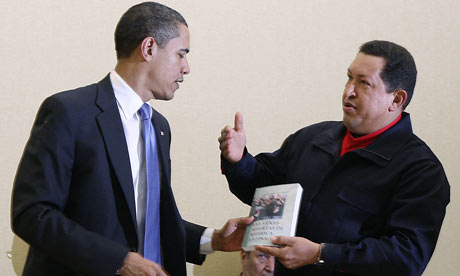Without any hint of irony or humour, The Guardian worries that Western influence within the United Nations is waning — worrisome because it wrecks “efforts to entrench human rights, liberties and multilateralism”.
Drop in influence at UN wrecks western attempts to push human rights agenda
The west’s efforts to use the United Nations to promote its values and shape the global agenda are failing, according to a detailed study published yesterday.
A sea change in the balance of power in favour of China, India, Russia and other emerging states is wrecking European and US efforts to entrench human rights, liberties and multilateralism.
This perhaps belongs in the same category of new-found Republican concerns regarding sexism and the Bush administration’s alarm at Russian unilateralism (vis-Ã -vis Georgia). Dare we remind them that the United Nations came about as a response to the two disastrous wars that these nations inflicted upon the rest of the unenlightened world? Or would that explicit notice have as little effect as the implicit caution offered by a history of colonialism, political mischief and unilateral intrusion (Iran, Iraq, Latin America, Afghanistan, Africa, India, Pakistan,…)?
A recent article in the New York Times presents an altogether different picture than the one The Guardian offers, when it comes to US interest or respect for other values and thought. The article ends with a quote from Northwestern law professor Steven Calabresi:
In “ ‘A Shining City on a Hill’: American Exceptionalism and the Supreme Court’s Practice of Relying on Foreign Law,†a 2006 article in the Boston University Law Review, Professor Calabresi concluded that the Supreme Court should be wary of citing foreign law in most constitutional cases precisely because the United States is exceptional.
“Like it or not,†he wrote, “Americans really are a special people with a special ideology that sets us apart from all the other peoples.â€
Discussing the use of international opinion in judicial analysis, the NYT articles draws a telling contrast:
Judges around the world have long looked to the decisions of the United States Supreme Court for guidance, citing and often following them in hundreds of their own rulings since the Second World War.
[…] American constitutional law has been cited and discussed in countless decisions of courts in Australia, Canada, Germany, India, Israel, Japan, New Zealand, South Africa and elsewhere.
But many judges and legal scholars in this country say that consideration of foreign legal precedents in American judicial decisions is illegitimate, and that there can be no transnational dialogue about the meaning of the United States Constitution.
[…]
The Constitution should be interpreted according to its original meaning, said John O. McGinnis, a law professor at Northwestern, and recent rulings, whether foreign or domestic, cannot aid in that enterprise. Moreover, Professor McGinnis said, decisions applying foreign law to foreign circumstances are not instructive here.
“It may be good in their nation,†he said. “There is no reason to believe necessarily that it’s good in our nation.â€
[…]
In any event, said Eric Posner, a law professor at the University of Chicago, many Americans are deeply suspicious of foreign law.
“We are used to encouraging other countries to adopt American constitutional norms,†he wrote in an essay last month, “but we have never accepted the idea that we should adopt theirs.â€
“It’s American exceptionalism,†Professor Posner added in an interview. “The view going back 200 years is that we’ve figured it out and people should follow our lead.â€
[emphasis mine]
In contrast, the New York Times describes the attitude elsewhere (including in India, a country that The Guardian laments is gaining influence in the UN, and whose UN soldiers are prominently pictured at the top of The Guardian’s piece):
The openness of some legal systems to foreign law is reflected in their constitutions. The South African Constitution, for instance, says that courts interpreting its bill of rights “must consider international law†and “may consider foreign law.†The constitutions of India and Spain have similar provisions.
and explains why a shift away from US standards and opinion is occurring:
Frederick Schauer, a law professor at the University of Virginia, wrote in a 2000 essay that the Canadian Supreme Court had been particularly influential because “Canada, unlike the United States, is seen as reflecting an emerging international consensus rather than existing as an outlier.â€
Read the full post and comments »


